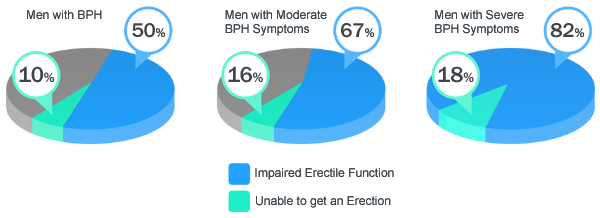Major Questions about ED Problems
If you suppose that you have erectile issues, there are certain facts that you need to know. When men are sexually aroused, blood vessels, nerves, muscles and hormones work to create firm erection. However, men may have difficulties maintaining and getting an erection at some point in their lives. If you have erection problems, this means that you can’t get and keep an erection that is firm enough for your sexual intercourse. For most male patients, these issues occur occasionally, so they are not serious. But if you can’t achieve and maintain a hard erection on a regular basis, this means that you have a medical condition that requires doctors’ attention. It’s also called impotence, erectile dysfunction, ED and sexual dysfunction.

What Are Their Common Causes?
Basically, they all can be categorized as psychological, physical and their certain combination, but keep in mind that physical causes are more common in older male patients. They happen because of specific disorders that affect their blood vessels and nerves responsible for getting and keeping an erection. For instance, erectile dysfunction can be caused by such widespread physical causes as hypertension, heart problems, diabetes, high cholesterol levels, obesity and others. If you take specific medications, including beta-blockers, diuretics, antidepressants and muscle relaxants, you may end up with ED problems too. Don’t forget about increased risks associated with long-term smoking, alcoholism, traumas, genital problems, kidney diseases, treating prostate conditions, etc. Erectile dysfunction is also caused by certain mental or emotional issues because they often distract men of different age from becoming sexually aroused. The most common ones include depression, prolonged emotional stress, relationship problems and worries about not being able to get and keep a lasting erection.
Do Young Men Have ED Problems?
The bad news is that impotence may affect even men whose age is 20-30, and there are many studies which prove that these problems are connected with their lifestyle habits and psychological climate, but not with physical issues. That’s because young men smoke, drink and take drugs more than older male patients.
How to Diagnose ED?
To determine the main cause of your erectile problems, you need to see your doctor who will order different tests, including the following:
- It’s a set of blood tests prescribed to check your low red blood cells.
- Your hormone profile that measures the level of such sex hormones as prolactin and testosterone.
- Urinalysis that measures your testosterone and protein levels in the urine.
- Duplex ultrasound that uses high-frequency sound waves when picturing specific body tissues.
- NPT that is used to measure the functions of your erection when sleeping.
Once the main cause of erectile dysfunction is determined, the best treatment will be defined by your doctor.
What about Possible Complications?
There are certain complications that may come with ED problems, and some of them are quite significant because they may have a negative impact on the rest of your life. For example, when having erectile dysfunction, you may also end up with regular stress, anxiety, low self-confidence, relationship difficulties, embarrassment, dissatisfaction, etc.
How Are ED Problems Treated?
Their severity can be graded as a 3-point scale, including complete, moderate and mild. The basic step that should be taken to treat them is to identify where you’re on this scale. Take into account that their causes also pinpoint a few phases of your sexual response, such as orgasm, arousal and others. If you have problems with any of them, they are considered as the main source of impotence. Once the causes and severity are determined, erectile dysfunction is quite easy to treat, and there are different options to choose from, such as special surgeries, oral medications, vacuum devices and injections.
Do You Need Lifestyle Changes?
Unfortunately, many of those causes that result in ED problems are connected with lifestyle choices, and that’s why you should take into consideration such healthy guidelines as stopping smoking, avoiding alcohol, relaxing, eating healthy food products, discussing sexual difficulties with your partner and training on a regular basis. If these lifestyle changes don’t help you to get rid of unwanted ED symptoms, visit your doctor who will examine your penile area, ask specific questions about your current health condition and take other necessary steps. When do you need to call physicians? If your mild ED problems develop or get worse, don’t hesitate to go to a hospital to get a detailed consultation because this medical condition can’t be neglected.



